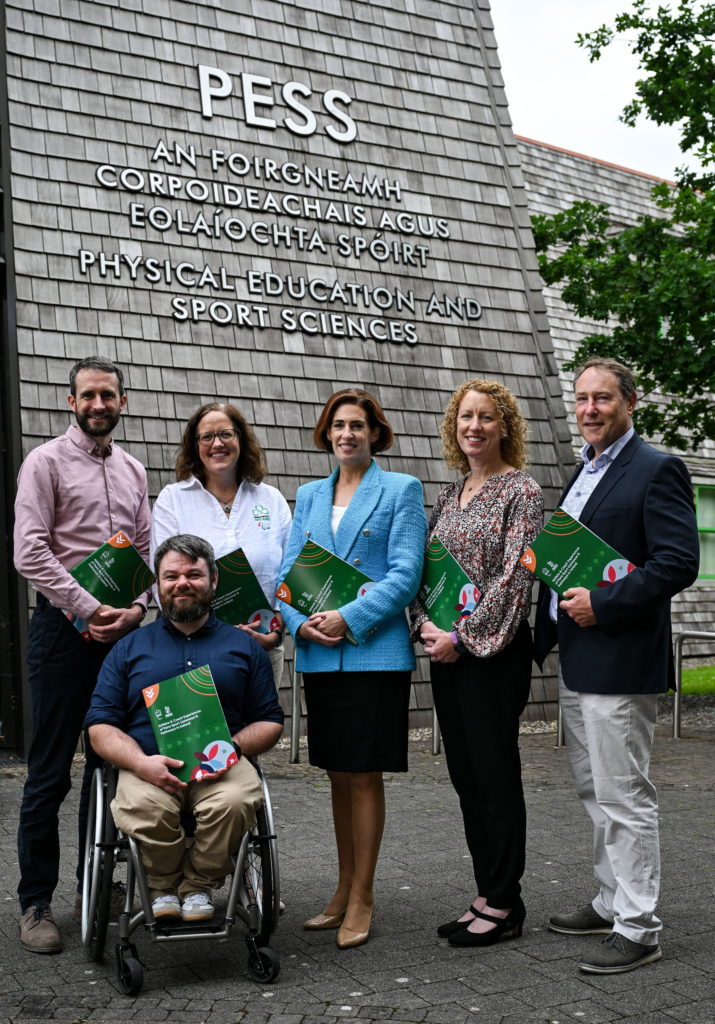NEW research has revealed striking inequalities in access to Para sports in Ireland.
The report found girls and those who become disabled in later life face more challenging pathways when attempting to access disability sports.
The far-reaching study, a collaboration between the University of Limerick and Paralympics Ireland, examined the lived experience of Para athletes and coaches across the country.
It found that girls with disabilities begin participating in Para sport nearly a decade later than boys.
The finding “points to a stark gender disparity that limits early engagement” the report authors state.
The study also found that individuals with acquired disabilities face significantly more obstacles to participation than those with congenital disabilities.
 Pictured at the launch (l-r) Dr Seán Healy, research assistant Alan Dineen, Paralympics Ireland COO Neasa Russell, Disability Minister Hildegarde Naughton, Limerick Councillor Frankie Daly, the University of Limerick’s Professor Elaine Murtagh and Dr Ian Sherwin (Pic: Brendan Moran/Sportsfile)
Pictured at the launch (l-r) Dr Seán Healy, research assistant Alan Dineen, Paralympics Ireland COO Neasa Russell, Disability Minister Hildegarde Naughton, Limerick Councillor Frankie Daly, the University of Limerick’s Professor Elaine Murtagh and Dr Ian Sherwin (Pic: Brendan Moran/Sportsfile)Despite these challenges, the report highlighted the “profound impact” of Para sport in improving physical and mental health, fostering independence, and enhancing quality of life for participants.
The report calls for better use of the untapped potential of schools, families, and rehabilitation settings as entry points into sport.
These environments, the study finds, are “critical to long-term engagement but remain underutilised”.
The research also calls for “targeted investment in local programmes, increased access to trained coaches, and improved availability of adaptive equipment to create more inclusive sporting opportunities across Ireland”.
Ireland’s Disability Minister, Hildegarde Naughton attended the launch of the report, titled Gateways & Pathways: Athlete and Coach Experiences of Para Sport in Ireland, at the University of Limerick this month.
“Sport and physical activity is crucial for the health and wellbeing of our society, she said.
“I am a firm believer that all people should have the right to enjoy sport which brings so much to all our lives.
“It keeps us healthy, and it is the backbone of our communities.”
She added: “Despite recent and welcome progress, there remains an enduring participation gap between persons with a disability and those living without such challenges.
“The research we are publishing today will form a critical part of how we will continue to work together, as a government and a sporting community, to break down barriers to sport.”
Dr Sean Healy, who was the lead researcher on the project, said that the findings of their study must be a catalyst for change.
“This research is a call to action,” he said.
“By identifying where the system is falling short, we now have the opportunity to reshape how Para sport is delivered in this country.”
He added: “The recommendations offer a clear roadmap for making sport more inclusive, equitable, and impactful for people with disabilities.”
Neasa Russell, Paralympics Ireland’s Chief Operating Officer, said the findings reinforce what was “already felt” among the Para sports community.
“This research shines a powerful light on both the barriers and the opportunities within Irish Para sport,” she said.
“It confirms what many in our community have long felt – that access is unequal, especially for girls and for those who acquire a disability later in life.
“But it also highlights the transformative role sport can play when those barriers are removed.”
She added: “Our job now is to act on these findings and ensure that every person with a disability, regardless of gender, age, or background, has a clear and supported pathway into sport.
“That is the vision we are committed to delivering.”
Paralympics Ireland and University of Limerick will now begin working with key stakeholders to explore steps to implement the report’s recommendations.

